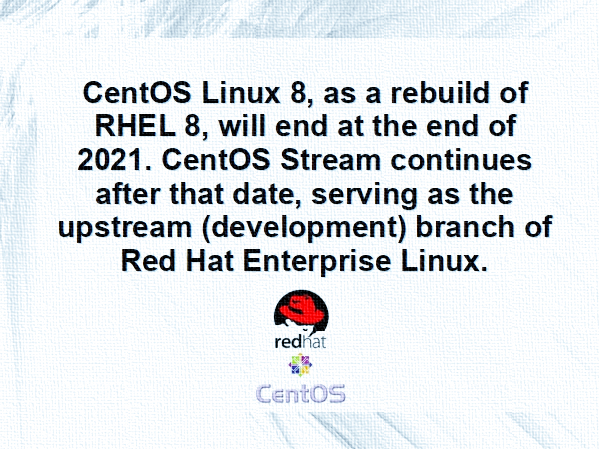- Jul 1, 2001
- 25,134
- 2,450
- 126
I noticed that Red Hat is no longer going to be supporting CentOS as a free alternative to Red Hat Enterprise Linux, and will now be using CentOS as a test branch for new RHEL releases as "CentOS Stream" instead:

 www.cyberciti.biz
www.cyberciti.biz
Of course, most people use CentOS as a free unsupported version of RHEL in their development and test environments. This change basically means that it can longer be used for that purpose, as it's now going to be ahead of Red Hat releases instead of being in-sync with them.
So, what do you think you're going to use as a replacement for CentOS?
Scientific Linux used to be a free compatible alternative to RHEL, but they never did a version 8 of it.
Amazon offers their own free RHEL clone called Amazon Linux, but it's not 100% compatible and is really optimized for AWS (naturally).
Oracle does a free RHEL clone called Oracle Linux, but... it's from Oracle. Eww.
I guess that I could just switch to Ubuntu, but that would pretty much require rewriting all of my installation scripts to use apt-get instead of yum. Ubuntu also keeps a lot of its configuration files in different locations, which would also make switching a pain.

CentOS Linux 8 will end in 2021 and shifts focus to CentOS Stream - nixCraft
CentOS Linux 8, as a rebuild of RHEL 8, will end in 2021. CentOS Stream continues, serving as the upstream (development) branch of RHEL 8.
Of course, most people use CentOS as a free unsupported version of RHEL in their development and test environments. This change basically means that it can longer be used for that purpose, as it's now going to be ahead of Red Hat releases instead of being in-sync with them.
So, what do you think you're going to use as a replacement for CentOS?
Scientific Linux used to be a free compatible alternative to RHEL, but they never did a version 8 of it.
Amazon offers their own free RHEL clone called Amazon Linux, but it's not 100% compatible and is really optimized for AWS (naturally).
Oracle does a free RHEL clone called Oracle Linux, but... it's from Oracle. Eww.
I guess that I could just switch to Ubuntu, but that would pretty much require rewriting all of my installation scripts to use apt-get instead of yum. Ubuntu also keeps a lot of its configuration files in different locations, which would also make switching a pain.






